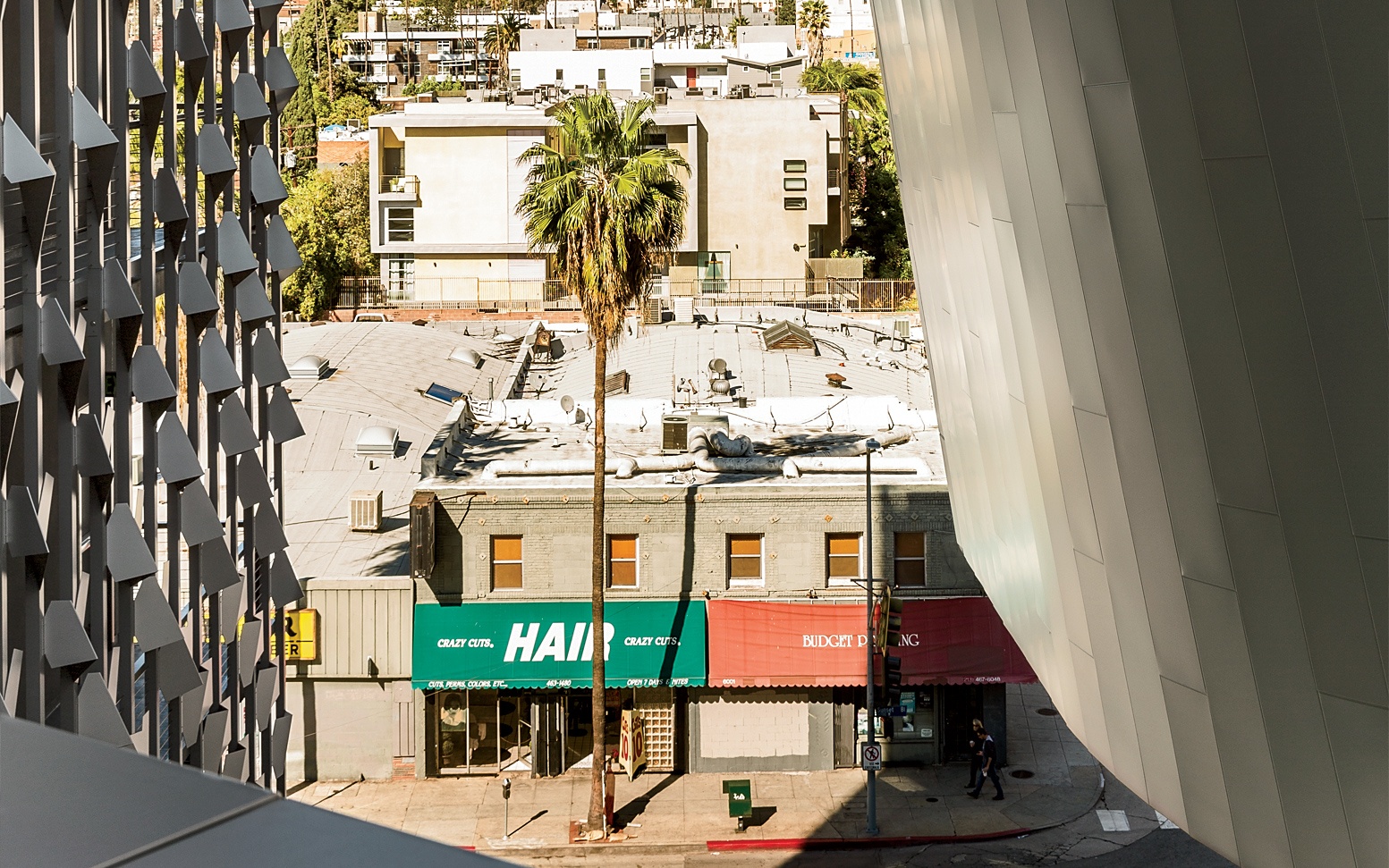
The once-neglected district may have had a little work done, but it’s still seductively seedy.
A lissome brunette in a Prohibition-era dressing gown introduces herself as Charlotte, the “madam of the house.” She flips a switch, revealing a staircase that leads to a wallpapered parlor where a DJ is spinning 1970s soul. The attractive patrons, who likely consider themselves artists, actors, and models, sip cocktails. On the porch, burlesque dancers shimmy to a live jazz band. A bricked-in garden conceals this silent-film-era hideaway from the lights and clamor of Hollywood Boulevard’s Walk of Fame, just beyond. This is No Vacancy, a 21st-century speakeasy hidden inside a 1902 Victorian, opened two years ago by local nightlife entrepreneurs Mark and Jonnie Houston as an homage to the neighborhood’s glory days. It’s a bit of new Hollywood, dropped into the old.
Erica Jong wrote that Hollywood is located “chiefly between the ears in that part of the American brain lately vacated by God.” For most people, Hollywood is less a place than an idea—one that includes destinations like the Chateau Marmont and that famous sign, which don’t lie within the district’s actual boundaries. Those are commonly accepted as Franklin and Melrose Avenues to the north and south, respectively, and Western and Fairfax Avenues to the east and west. And with its Art Deco towers and faded movie palaces, the sometimes seedy section of Hollywood Boulevard that runs through the heart of this three-square-mile zone is the last remnant of what the neighborhood once was.
Two decades ago, this place was all tattoo parlors and sex stores. Helen Mirren once told me she went to the “stripper district,” a stretch of risqué lingerie shops, for her awards-show secret weapon—“pole-dancer shoes with plastic platforms and heels that make you seven inches taller.” I myself used to revel in the Raymond Chandler vibe of the old movie-colony haunts—Grauman’s Chinese Theatre, the Magic Castle, the Musso & Frank Grill, and the Hollywood Roosevelt hotel—and the gritty side streets that felt like Bukowski turf.
But like downtown L.A., another formerly forlorn enclave a few exits down the 101, Hollywood is in transition. It began in the early aughts, when creative companies drawn to the area’s cheap spaces and rich history moved in—like the art-book publisher Taschen, whose U.S. offices are in the 1936 Crossroads of the World complex, and the cinephilic fashion label Band of Outsiders, headquartered across from the Hollywood Forever Cemetery. Private development came in tandem: after the Dolby Theater in the Hollywood & Highland complex brought back the Oscars, Thompson Hotels rebooted the Roosevelt, luring nightlife to the area again. Kerry Morrison, executive director of the Hollywood Property Owners’ Alliance, cites nearly $5 billion in investments since 2000 in the commercial district her group manages, which she insists will soon be “the most vibrant downtown in Los Angeles.”
Now, stylish newcomers are opening nonstop. At the once-sketchy intersection of Hollywood and Vine, the glass-and-steel W and the homey Redbury hotels have joined the Philippe Starck–designed Katsuya Restaurant near the Capitol Records Building. More high-profile hotels are coming, including the Dream Hollywood and the first U.S. outpost of Starck’s Mama Shelter brand. Nearby Cahuenga Boulevard, once a no-man’s-land, now features the street-fashion arcade Space 15Twenty, nightlife venues Saint Felix and the Hotel Café, and the organic small-plates restaurant Birch. And the powerhouse art gallery Regen Projects has a two-year-old location on Santa Monica.
Much of the area’s appeal—besides the advantages of a gentrifying neighborhood—comes from its stock of Victorian and Deco buildings, which lend history and urbanity in a city where both are in short supply. On North Bronson, the intimate Lombardi House is a hotel that, like No Vacancy, occupies a restored turn-of-the-century house. And the Houston brothers have opened no less than seven time-capsule lounges throughout the neighborhood. This summer, the New York co-working space NeueHouse will debut in the old CBS Building on Sunset, and in 2016 MTV and Comedy Central will set up shop next door. The area is also proving to be a canvas for architectural experiments, like the futuristic $110 million campus for Emerson College by Pritzker Prize–winning architect Thom Mayne.
No, it’s not Chandler’s Hollywood anymore. But the street outside of No Vacancy still feels like its old self. And while Angelenos do welcome the cool-kid newcomers, many, like me, are relieved that this tarnished patch of Tinseltown hasn’t become overly sanitized. “There’s something stubbornly authentic and gritty about Hollywood Boulevard,” says Fenton Bailey, cofounder of the production company World of Wonder, located on the street. Jimmy Kimmel, who hosts his talk show from a theater nearby, agrees: “You can see Robert Downey Jr. getting a star on the Walk of Fame while a guy dressed in an Iron Man costume hustles tips twenty feet away,” he says. “Hollywood is a place where abnormal is normal.”